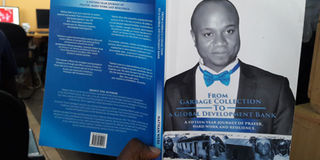From Garbage Collection to a Global Development Bank

What you need to know:
- Good grades at O-Level earn him a full bursary to study higher education at Highway College Makerere from where he joins Makerere University on government sponsorship.
Title: From Garbage Collection to a Global Development Bank
Author: Nathan Were
Pages: 156
Reviewed by: Isaac Mufumba
Readers of the Bible are conversant about the teachings in 1 Samuel 2:8.
“He raises the poor from the dust and lifts the needy from the ash heap. He seats them among princes and bestows on them a throne of honour.”
That resonates with Nathan Were’s narrative in the book, From Garbage Collection to a Global Development Bank , which is scheduled to be launched tomorrow morning at St Francis’ Chapel, Makerere University.
The narrative is in simple and colourful language. The first in a family of seven children, Were tells his story of 15 years of prayer, hard work and resilience, beginning with his birth and early years in Busitema.
He lives with mostly a mother who, in the absence of their father, has to juggle between tailoring and a small retail shop in order to fend for the family.
A reunion with their father who was away studying theology in Kenya only happens when the family moves to Busia, Kenya, where they live in a single room tenement that can hardly accommodate all of them. They suffer a culture shock as they meet people from all walks of life and are compelled to learn Swahili.
It is only after his father is ordained a priest and posted to Sikinga Parish, in Bungoma, Kenya, that they get to live in house that can comfortably accommodate them. It is also the first time they see modern flush toilets and bathrooms. Little wonder that they would spend several minutes in the bathroom, to keep, in his own words, “enjoying the rain that could only fall in one part of the house – the bathroom”.
This may sound outlandish to most of us who were born and raised in town, but it is the story of most Ugandans born in the rural areas. Most of these first got to see modern toilet facilities at university, so this is not only the story of Nathan Were, but the story of a majority of Ugandans.
Now most Christians are oblivious of the fact that priests are human too. Christians often do not stop to think that the men to whom they run to pray, comfort or commiserate with them suffer in much the same way as they do.
It is a thinking that this narrative seeks to address as it bares the challenges that priests’ children face in the area of education because of frequent transfer of their parents. He went five different primary schools.
This narrative is also in part a call to the Church to reconsider its policy on transfers, something which he says is pegging back development in the Anglican Church in Uganda and most of the region as most priests start mega projects, which they are forced to abandon because of transfers.
Were takes us through the journey of their return to Uganda and relocation to Kabula County in Lyantonde, where besides them facing the challenge of not knowing Luganda, they trek long distances to school.
Staying in Lyantonde with his maternal grandmother, to whom the book is dedicated, teaches him to learn to pay attention to detail, manage time well and work hard. All those have since come handy.
For most children, the Primary Seven vacation is a time to relax, but not so for him. It was during that time that he got his first job as a porter on a building site at the age of 13. He was to later work on a road construction project, did some charcoal burning, hunting animals and hawking second-hand women’s shoes.
When he moves to Kampala for his secondary school education, Were is forced to wash clothes and cars, collect garbage and try a hand at photography as part of the constant struggle against poverty and deprivation.
Good grades at O-Level earn him a full bursary to study higher education at Highway College Makerere from where he joins Makerere University on government sponsorship.
He has further education at the University of Bergamo, Italy, and later Harvard Business School in the US and has since become a finance specialist with the World Bank, truly raised from the ash heaps and seated among princes.
This book is a tale of faith in God, courage, tenacity and resilience. It will inspire those that are struggling by reminding them that no situation is permanent.




